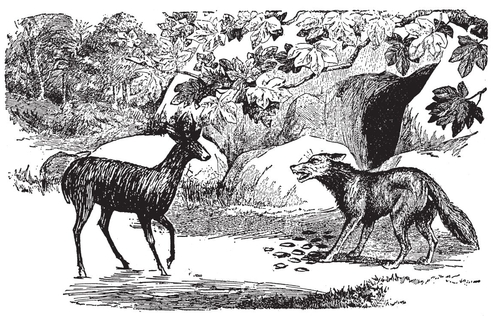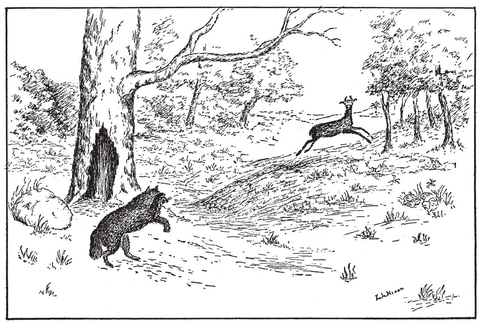The Antelope and the Jackal
The little antelope had been living high. He had been buying everything that was good and costly, food, drink, and the most expensive clothing. Then, as the moon rose, he would invite his friends. The drums were beating and the animals were dancing and singing till the breaking of the day drove them home; and the little antelope paid for everything.
One day after a night’s feasting the little antelope awoke. He went to his money bag; but, turning it inside out and outside in, he could not find in it a single cowry to buy himself food for breakfast. He had had plenty, and now he had nothing.
“What does it matter,” said the little antelope, “my friends are expecting me to continue our feasting; I will ask them to lend me some money and we shall keep on having a good time.”
He found his friends at the accustomed place, but when he informed them that he wanted to borrow money they left him abruptly. Those able to run ran, those able to fly, flew. The tortoise, not able to run or to fly, drew back into its shell and shut it with a snap that sounded like a clap of thunder.
“Dear, dear,” said the little antelope; “what am I to do now? My friends having treated me so shabbily. I will go to my old enemy the jackal and see what he will do for me.”
Off the little antelope went and found the jackal in front of his house counting a large bag of cowries. “Hundred, hundred and one, hundred and two . . .”

The Antelope tells His troubles to the Jackal.
The little antelope’s mouth watered at the thought of the large quantity of food this money would buy.
“Good morning, Uncle Jackal,” he said humbly. “I hope you are well, and that your wife is also well, and your children too!”
“Hum,” said the jackal, “hundred and ten, hundred and eleven . . .”
“Come another day . . . hundred and twenty . . . I am busy today . . . hundred and twenty-one . . .”
“May I come tomorrow?”
“I am going to a wedding tomorrow . . . hundred and thirty . . . I have to clear a field the day after . . . hundred and thirty-one . . . the next I have to attend a funeral . . . hundred and thirty-two . . . the next day . . .”
“The next day you will have something else to do, I have no doubt. So we might just as well do the business now. I want to ask you a little favor . . .”
“Ask away . . . hundred and forty . . . but I am afraid . . . hundred and forty one . . . that I won’t be able to oblige you . . . hundred and forty-two.”
“How do you know? I have not yet told you what I want.”
The jackal sneered; he had heard of the trouble his old foe was in. “I just have an idea . . . hundred and fifty . . .”
“I want you to lend me a few cowries . . .”
The jackal stopped counting. “Lend you money? If you want money, why don’t you go to work instead of always seeking your pleasure, you good-for-nothing scamp? Then you will get all the money you want.”
“I am itching to work,” said the little antelope; “work is real passion with me.”
“Well, then, why don’t you?”
“Did you not tell me the other day that I must never give way to my passions?”
The jackal remembered having said something like that, but somehow it did not seem to fit in just now. He wondered why. So he grumbled:
“Work ought to be a pleasure to honest people.”
“Yes, yes,” said the little antelope, “quite so. You have just told me that only good-for-nothing scamps always seek their pleasure.”
The jackal, stupid as he was, saw now that the little antelope was making fun of him. The little antelope always did it. If only he could get his own back and play some trick on him. . . . Suddenly he thought of a hollow tree he had noticed the other day, and a cruel idea occurred to him.
“I will lend you no money,” said he, “because, first of all, I have none; secondly, the little I own I want myself; and thirdly, what I can spare is better in my money bag than in yours. But I will help you in another way. I know of a treasure . . .”
“If you know of a treasure, why don’t you get it yourself?” asked the little antelope, who was on his guard.
“Because it is in a hollow tree, and, hard as I tried, I could not squeeze through the opening. You are small and slender and I will push you; you might get in.”
This gave the little antelope confidence; but still he was afraid that if he did succeed in getting the treasure the jackal would take it from him as soon as he had brought it out. So he thought it might be wise to offer him beforehand a big share of it that he might be honest about the rest.
“I am willing,” said he, “but as it is you who found the treasure, you must take nine-tenths of it for your share.”
“No, no; keep it all,” said the jackal, who could be generous—when there was nothing to lose. He well knew that there was no treasure in the hollow tree.
Then there began the strangest haggling the world has ever seen. Each one wanted to give more and to take less money as if they were in a combat. At last the little antelope, who was burning with the desire to handle the treasure, said:
“Let us agree to this: each will have an equal share, and then we shall add a little to it so that I shall have more than you and you will have more than I.”
This seemed to be a fair bargain to the jackal, and he suggested that they start at once to find the treasure. Soon they came to the hollow tree. The hole was small; but the little antelope, having an empty stomach, and the jackal pushing with all his might from behind, at last got in. The antelope’s tail had not yet quite disappeared, when the jackal gave a shout of joy and rolled a huge stone in front of the opening.
“Have you found anything, antelope?” asked the jackal maliciously.
“Not yet.”
“I have. I have found a good dinner. Now I am going to make a big roaring fire round this tree, and when you are roasted nice and brown, you must come and have dinner with me.”
“Oh, do let me out, dear jackal, do let me out!” shouted the little antelope in anguish, having found out too late that he had allowed himself to be trapped by the stupid jackal.
“Not yet, my friend. I am too busy. Look at all the wood I have to pile up to roast you.”

The Antelope escapes from the Jackal.
And he went on piling up wood while the little antelope retired to the deepest recess of the hollow, trying to think of some way to escape. When the jackal had all the wood he wanted, he went to the tree and shouted!
“Halloo, antelope!” he shouted again, “are you there?”
“No,” answered the little antelope.
“What!” exclaimed the jackal furiously, “how can you say that?”
“I am not telling a falsehood; I am not here.”
“But are you sure of that?” asked the jackal anxiously.
“Well,” giggled the little antelope, “who should know better than I? But if you doubt, take a look.”
In all haste the jackal removed the twigs and then the stone; as soon a he had done so the little antelope threw some dirt into his eyes, and while the jackal was trying to remove it the little antelope slipped out of the tree. The blinded jackal soon was banging his head against the stone, against the tree, and tumbling over the twigs, while the antelope was running home as fast as he could.
Good Traits
If one knows thee not or a blind man scolds thee, do not get angry.
He who forgives ends the quarrel.
Hope is the pillar of the world.
At the bottom of patience there is heaven.
Patience is the best of qualities; he who possesses it has all things.
Property is the prop of life.
A wealthy man always has followers.
If one does good, God will interpret it to him for good.
The coming year is not out of sight, let us be up and work.